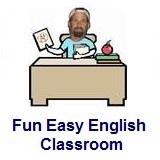Grammar:
Conjunctive
Adverbs
Definition of a conjunctive adverb. |
- A conjunctive adverb:
- shows the relationship
between, and join together, two
sentences or
clauses
- shows cause and effect,
sequence, contrast, comparison, or other relationships
- Use a
semicolon to join two
independent clauses
- I want to sleep; however, I
need to study.
- Use a
comma following the conjunctive adverb when it
appears at the beginning of the second
clause
- The exam was very difficult;
consequently, the students received only average
grades.
- A conjunctive adverb used at the beginning
of a
sentence uses a
comma to set it off, with a
period taking the place of a
semicolon
- The date was over. Therefore,
I went home.
- A conjunctive adverb placed within a
clause uses
commas to set it off
- The date is over. I will, therefore,
go home.
- Like other
adverbs, conjunctive adverbs may move around in the
clause (or
sentence) in which they appear. When they appear at the
end of the
clause, they are preceded by a
comma. If they appear in the middle of the
clause, they are normally enclosed in
commas, though this rule is not absolute and is
not always applied to very short
clauses.
-
Learn the
adverb spelling rules
|
|
Conjunctive
Adverb Examples |
- The exam was very difficult;
consequently, the students received only average
grades.
- There was practically no food in the refrigerator;
therefore, we had to go shopping.
- Brent enjoys video games; thus,
he is in good company.
- He went to the store; however,
he did not buy anything.
- The following words are conjunctive adverbs
- accordingly, also, anyhow, anyway, again, besides,
certainly, consequently, contrarily, finally, further,
furthermore, elsewhere, hence, henceforth, however, in contrast,
incidentally, indeed, instead, likewise, meanwhile, moreover,
namely, nevertheless, next, nonetheless, now, otherwise,
similarly, so*, subsequently, still, that is, then, thereafter,
therefore, thus, undoubtedly
- * so is a conjunctive adverb, when its
meaning is therefore; otherwise, it can be either a
coordinate conjunction or a
subordinate conjunction
|
|
Fun Easy English Grammar Lessons |
|
|
Additional Lessons |
 About These
Lessons About These
Lessons
The following classroom lessons are great for students
who want additional conversation, listening, and reading
practice. |
-
Conversation Lesson -
Advanced
Level. Dialogs for everyday use.
Short situational dialogs for students of English as
a Foreign (EFL) or Second (ESL) Language with a
written conversation and a conversation notes
section.
|
 Conversation Lesson
17 - Catching Up After Class Conversation Lesson
17 - Catching Up After Class
(Advanced -
Conversation, Reading)
Dialogs for everyday use. Short situational dialogs for
students of English as a Foreign (EFL) or Second (ESL)
Language. |
Catching Up After Class
LINDA: Hey! How did your physics exam go?
FRANK: Not bad, thanks. I’m just glad it’s
over! How about you … how’d your presentation go?
LINDA: Oh, it went really well. Thanks for
helping me with it!
FRANK: No problem. So … do you feel like
studying tomorrow for our math exam?
LINDA: Yeah, sure! Come over around 10:00,
after breakfast.
FRANK: All right. I’ll bring my notes. |
|
Conversation Notes |
- Hey! is a friendly expression meaning “hello.”
- How did your physics exam go? is a way of saying “How
was your physics exam?”
- I’m just glad … Notice the stress on “glad.” “Just” is
used for emphasis before an adjective here.
- How about you … Notice the intonation falls here because
the speaker is going to follow it up with a detailed question.
- How’d your presentation … Notice the contraction for
“How did” sounds like /howdj/ and “your” sounds like /yer/.
- Do you feel like here has the meaning of “do you want
to.” Notice “do you feel like” is followed by an “-ing” verb (studying).
- Come over here has the meaning of “come to my house.”
- Notes. Students take notes about what the teacher says
during a lecture.
|
|
Source: U.S. State Department |
|
Additional Conversation |
 Conversation Conversation
This is a collection of 30 situational conversations
which focus on a wide variety of communicative and
natural encounters in English....these
lessons are for beginning students. |
 Conversation Conversation
This is a collection of 36 situational conversations
which focus on spoken American English in a relatively
natural way....these
lessons are for intermediate students. |
 Conversation Conversation
English conversation lessons. 52
lessons covering pronunciation, speaking,
writing, and grammar topics....these
lessons are for beginning students. |
 Conversation Conversation
English conversation lessons. 30
lessons focusing mostly on communication and
grammar topics....these
lessons are for intermediate students. |
|